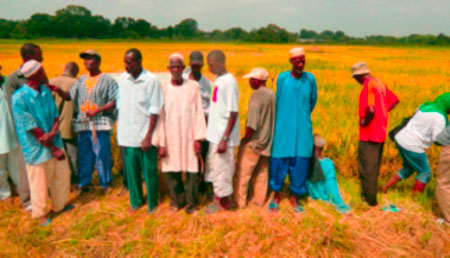
Over fifty famers within Sapu catchment area in the Central River Region last Tuesday embarked on a daylong participatory rice varietal selection at the Sapu swamp rice field.
The exercise, which brought farmers within the various areas, was organised and conducted by officials of the National Agricultural Research Institute (NARI) under the serial banking programme with support from the Africa Rice Centre.
The exercise was part of their annual programme of activities to bring farmers together under a single umbrella to adopt bottom-top approach by involving the farmers to take part in the varietal seed rice selection trial.
Speaking during the exercise, the station manager of Sapu, Essa Drammeh, said the purpose of the exercise was to bring farmers together to share best practices regarding the seed varietal selection.
He expressed hope that the exercise will serve as a trial for the farmers as well as encourage them to partake in the seed selection process.
He said that initially the researcher would do the selection process of the various varieties for farmers, which was not favourable to the farmers, as most of them faced so many problems in their crop produce.
He added that it was based on that NARI came up with the new approach, the bottom-top approach, whereby farmers will be part of selecting their choice of varieties for their own benefit.
He explained that the activity was geared towards ensuring that farmers participate fully and carefully in selecting their choices of rice varieties.
According to him, during the exercise thirty-five varieties are expected to be screened, out of which ten will be selected by each farmer.
He also told the farmers that after selecting their choice of varieties, they have to give reason(s) to the NARI officials for selecting those varieties.
He also stated that farmers will be given the opportunity to select at least three varieties for rejecting them, which was done by the farmers through interview by staff of NARI and extension workers.
For his part, Demba Jallow of NARI serial programme, thanked farmers for responding to their call and for participating fully in the exercise.
He added that the exercise would show the selection of 35 rice seed varieties and ten out of these varieties would be screened by the farmers for future uses.
He then challenged the farmers to participate fully as the exercise is very significant as far as rice production is concerned.
He added that it is a challenge on the farmers to ensure they select their choices of seeds for better production and productivity.
For his part, Abas Jaw, NARI senior staff, and also the focal point for rice breeding activity in The Gambia, said the purpose of the exercise was to ensure farmers take part in the participatory varietal selection of one of their irrigated trials in the Sapu rice field.
He said the exercise was a joint collaboration between NARI and the Africa Rice Centre to screen varieties for adaptation and adoption.
He said the activities were also to bring farmers together, as well as producers, actors, extension workers, and NGOs, to witness the exercise for them to engage in the varietal rice selection process.
According to him, NARI has realised that during the breeding process, NARI selects all the varieties on behalf of the farmers, and then disseminate them to the farmers, in which NARI is trying to change direction by now involving the farmers in the whole selection process.
She said this is why Africa Rice Centre and NARI came up with this innovation to involve the farmers in the whole show.
She said the purpose of the selection is to ensure that farmers come out with at least ten few varieties that can be grown in The Gambia to realise food security.
The director of research at NARI, Dr Lamin Jobe, thanked the famers and the NARI officials for ensuring that farmers participate in this very important innovation process.
He noted that the best way to attain food security is to ensure that farmers partake in the whole process, for better production and productivity.
He also urged the farmers to adopt best practices in their farming system, as well as take the advice of their extension workers.
The purpose of this exercise is to ensure that farmers have the best varieties that will yield dividends at the end of their cropping season, he said.
With this new innovative process, hopefully, farmers will put their agenda forward to attain food security, provided the farmers have adopted the best practices needed for agricultural purposes.
According to the director, the objective of the participatory evaluation trial (PET) for irrigated lowland is to identify breeding line adapted to lowland ecologies and have traits that are resistant to flood and iron toxicity.
Mr Gung-Chau Sung of TaiwanTechnical Mission hailed NARI for coming up with the demand-driven initiative for farmers.
He said that involving the farmers who are the direct beneficiaries will immensely yield dividend for them and the country.
He then challenged the farmers to listen to the advice given to them by NARI, as well as extension workers, as sharing of experiences could greatly help the farmers.
A farmer beneficiary Penda Mballow from Kerewan Saba Sira also thanked NARI for enlightening them on the selection process of their choices of varieties.
Read Other Articles In Article (Archive)
Gunjur Knock Enters Semis
Dec 8, 2009, 3:42 PM
Former Attorney General Jobarteh cross-examined
Nov 19, 2013, 3:16 PM


